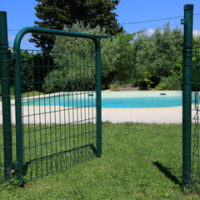Own a Pool? Then You Better Own a Fence Too.

Unless you live where it’s warm year-round or can withstand the bone-chilling costs of heating your pool in the winter, the arrival of summer likely heralds the opening of swim season in your backyard. If you have recently installed a pool – above-ground or in-ground – or purchased a home that comes with a pool, make sure you are up to speed on local laws in your area requiring adequate fencing and other measures to keep people, and especially children, safe in and around your pool.
Swimming pool accidents are not just some imaginary horror; swimming pool drownings are actually the leading cause of accidental death for children from one to four years old. Hundreds of children aged 14 and under drown every year, and over three-quarters of those deaths occur in children who are less than five years old. Additionally, thousands more children find their way to emergency rooms every year for treatment of pool and hot tub-related injuries. Non-fatal injuries include head and neck injuries leading to lifelong paralysis or brain damage.
The vast majority of these injuries occur in a residential pool.
Know Your Laws. Make Your Pool Safe.
A swimming pool is an attractive nuisance under the law. New York personal injury attorney Leandros A. Vrionedes explains that an attractive nuisance is an object that is appealing to children who are too young to understand the danger they may face. As the owner of an attractive nuisance, it is your responsibility to keep the pool area secured at all times, even when you have no reason to believe any one may be using the pool.
Swimming pool safety is governed not just by common sense but also by state and local laws. For instance, the state of New York requires that for any pool built or modified after 2006, the pool must be monitored by an alarm system that is capable of alerting the homeowner if someone enters the pool. Pool fences in New York must be a minimum of four feet high and completely enclose the pool to obstruct entry.
In neighboring New Jersey, pool fences must be at least five feet high surrounding the pool, with a self-latching gate and an entrance near the shallow end of the pool. New Jersey further requires a permit for any pool that holds water more than two feet deep, which could even include blow-up or “kiddie pools” of a certain height or depth.
Safety First, Fun Second.
Not every accident can be avoided, but taking reasonable steps for safety will prevent most accidents not caused by swimmer negligence or recklessness and may also help you avoid serious personal financial liability if another person is injured on your premises in a swimming pool accident. Besides installing a fence that meets local legal requirements, make sure you keep the fence maintained in good repair. Other aspects of pool safety to consider include placing signage around the pool about variable pool depths, using slip-resistant material on surfaces around the pool, and ensuring that the drain cover is always properly secured. With the proper precautions in place, your family can enjoy the pool all summer long, and you can enjoy pool ownership with peace of mind.



